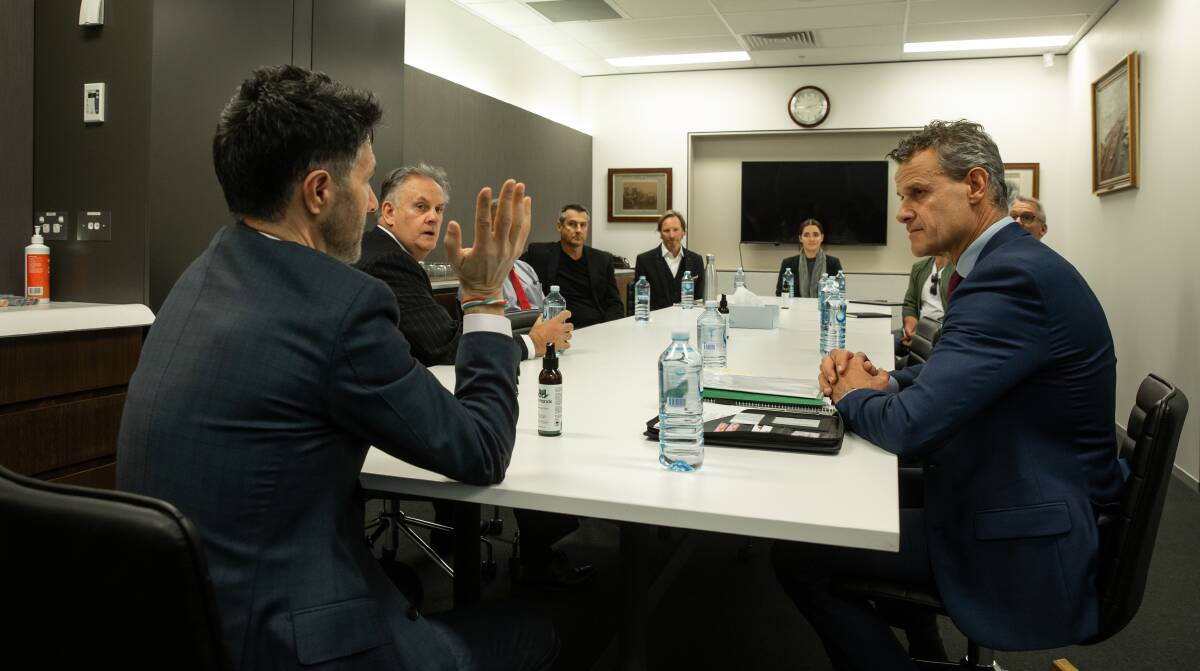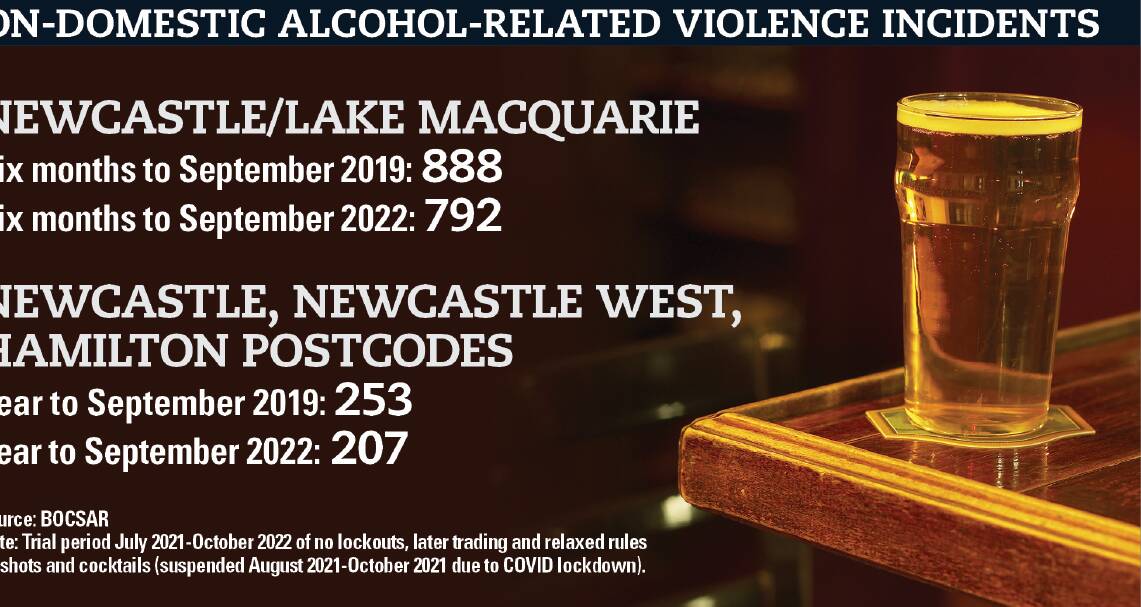
The NSW government again has opted for secrecy when it comes to removing lockouts and other restrictions on Newcastle pubs and clubs.
The Newcastle Herald reported on Tuesday that the committee overseeing a trial of relaxed restrictions had submitted a report to Liquor & Gaming NSW, the agency responsible for regulating the alcohol industry.
A Liquor & Gaming NSW spokesperson said the "detailed independent evaluation ... assessed a wide range of data and community and stakeholder views on the impact of the trial on venue patronage, employment, business turnover, noise complaints and levels of alcohol-related violence and offensive behaviour".
"In December 2022 the trial's steering committee endorsed the evaluation report. Liquor and Gaming NSW is preparing material to assist the Independent Liquor & Gaming Authority in its assessment of decisions to be taken in light of the report," the agency said.
Asked for a copy of the evaluation report, completed by Sydney-based consultants Woolcott Research, the NSW Department of Enterprise, Investment and Trade refused, saying ILGA had not considered the report and it would be not be appropriate to make it public until ILGA made any determinations.
It is not clear why it is "inappropriate" for the community to be informed about an issue of significant public interest.
The "Newcastle Solution" of lockouts and restrictions has been widely credited by police, doctors and community representatives with reducing late-night alcohol violence over the past 15 years.
Advocates for removing the restrictions, including the hotel industry, Customer Service Minister Victor Dominello, trial committee chair Mark Latham and Newcastle MP Tim Crakanthorp, argue Australia's drinking culture has changed and Newcastle deserves a chance to show it can act responsibly.
Lord mayor Nuatali Nelmes, whose council has broadly been in favour of relaxing the rules, said when the trial was announced in March 2021 that "some of the finer details of the trial seem yet to be finalised" and "I would have preferred a more consultative approach with the broader community".
She said it was "reasonable that the laws be tested" but it was "imperative" the community had the data to make decisions based on evidence.
Fast forward 21 months and ILGA is now apparently weighing up whether to scrap the restrictions based on a report which the community is not allowed to see.
The community at large will have the opportunity to comment on individual applications from venues to vary their liquor licences but apparently will not have the same access before ILGA makes a ruling on whether the broad CBD and Hamilton rules should change.
Cr Nelmes said on Thursday that the evaluation report should be released publicly.
The trial committee was formed in 2020 to oversee an earlier trial of later trading and relaxed alcohol restrictions in Newcastle's small bars and restaurants.
Mr Dominello declared that trial a success on its final day, March 31, 2021, before the committee had met to evaluate it, and promptly announced a second 12-month trial, this time removing 1.30am lockouts at about 20 higher-impact venues, extending trading hours to 3.30am and allowing venues to sell shots and cocktails after 10pm. The minister went so far as to say the second trial would "set the scene" for ILGA to consider a permanent end to the restrictions on a case-by-case basis.
Likewise, Mr Latham publicly declared the second trial a success in August, two months before it ended on October 17 and long before the committee evaluated it. Liquor & Gaming confirmed this week that the trial conditions were still in place, 12 weeks after the trial ended.
The committee, whose make-up varied from meeting to meeting, at times included about eight Newcastle council officers, eight from Liquor & Gaming NSW, ILGA chair Philip Crawford, Cr Nelmes, deputy lord mayor Declan Clausen, Newcastle MP Tim Crakanthorp, a senior police officer, a Hunter New England Health manager, two residents, Newcastle Tourism Industry Group and five hotel and bar industry representatives.
The only inner-city resident representative, doctor Anthony Cook, quit this year after claiming the trial was unscientific and appeared to have "predetermined political outcomes from the start".
He had argued unsuccessfully for researchers with expertise in alcohol harm to be included in the committee's deliberations.
As the Herald reported on Tuesday, the most recent official crime statistics for NSW suggest the trial suspension of the Newcastle Solution rules did not lead to an increase in alcohol violence.

The incidence of non-domestic alcohol-related violence was down slightly on pre-COVID levels in the year to September 2022 in the 2300, 2302 and 2303 postcodes covering the inner-city and Hamilton. The incidence of assaults on police was stable in the same period.
In April, a senior police representative told a trial committee meeting that violence related to licensed premises was at comparatively "low" levels, though the inner-city still had one of the highest rates of alcohol violence in the state.
The Bureau of Crime Statistics and Research warned this week that it was difficult to draw "robust" conclusions from the data due to the lingering effects of COVID-19.
Nine months after the April committee meeting, the community does not know how police feel about any looming decision to relax late-night trading rules.
A senior officer told the Herald in early 2021 that it would be "absolute lunacy" to remove the conditions, but Hunter police this week declined to answer questions about whether the trial had been a success and whether the lockouts and other restrictions could be removed safely.
Instead, police referred the Herald to the Department of Enterprise, Investment and Trade.
Hunter New England Health, which in the past has publicly opposed changing the Newcastle Solution rules and has written submissions opposing expanded trading in inner-city venues, also declined to comment.
Nor does the community know if the trial boosted patronage and employment in the participating venues.
A confidential report on the earlier trial, seen by the Herald, shows 9 per cent of the 127 eligible small bars and restaurants took part.
On average, participating venues reported a 64 per cent rise in business turnover, including all of the small bars.
Participating venues on average reported an 8 per cent rise in employee hours during the trial, though this was spread unevenly between small bars (63 per cent increase) and restaurants (10 per cent decrease).
The community now is left waiting for ILGA to make a call amid silence from the police, silence from the region's health service and no access to a crucial report on the success or otherwise of the trial that is informing the authority's decision.
Inner-city Newcastle still has rates of alcohol violence three times the NSW average.
Perhaps times have changed and the risk of removing the restrictions has diminished over 15 years, but one thing we do know is the public has been denied transparency in the decision-making.







